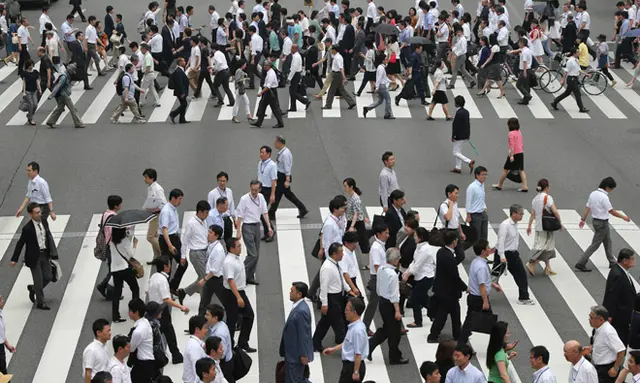Three years of so-called "Abenomics," Japanese Prime Minister Shinzo Abe's bold stimulus program, have failed to dislodge a deflationary mindset among businesses and consumers.
As the world's third-largest economy falters again--with a stronger yen gnawing at overseas profits and domestic consumption sapping companies' confidence to invest or sufficiently raise wages--firms that increased their prices in the hope of a sustained recovery are rethinking their strategy.
Many consumers, with little extra to go around, are opting for cheaper products--welcome news for the discount retailers who flourished during two decades of economic stagnation.
Housewife Yuko Narita, 48, says she is tightening the family purse strings and scouting around for sales on daily goods and clothing. "There's a sense the economy is stalling and companies' earnings are bad this year, so I'm holding off from spending on big items," she said.
Nobuko Jin, a 75-year-old part-time worker who receives some pension, says she is cutting back and just buying necessities. "I get the feeling prices are creeping up. I wonder where the benefits of Abenomics are going. I'm trying to spend less," she said.
Discount store operator Don Quijote Holdings, which sells everything from cosmetics and clothing to toilet paper, has seen business revive as the economy loses momentum. It expects operating profit to rise more than 4 percent in the year to next June. "Household spending won't be strong. That's when consumption centers on discount stores, so it's a tailwind for us," said Mitsuo Takahashi, the firm's chief financial officer.
Restaurant chain operator Skylark Group has cut prices on some items and is offering more cheap lunch menus to lure family diners. And Fast Retailing Co., owner of the Uniqlo casual wear brand, reversed course this year after two years of price hikes hurt its clothing sales. Its latest quarterly operating profit rose 18.6 percent.
"We'll continue with our (new) strategy and bring down prices this autumn and winter," said Ken Okazaki, the company's chief finance officer.
At discount furniture and home accessories retailer Nitori Holdings, chairman Akio Nitori said his company won't raise prices. "Once you lose consumers to your competitors with price hikes, it's hard to lure them back," he said.
"Renewed fears of deflation"
Japan's growth stalled in April-June, exports fell last month at the fastest pace since the global financial crisis, and the mood among businesses has deteriorated to pre-Abenomics levels.
This all makes it tougher for policymakers, already struggling to fend off external risks, to shift Japan's deflationary mindset.
The gloom is broadening beyond exporters hit directly by the renewed strength of the yen, which drove down the U.S. dollar to around 100 yen--some 25 percent below levels a year ago.
"We're seeing renewed fears of deflation as the environment surrounding consumption is worsening," said Akihiro Ito, senior executive officer at beverage maker Kirin Holdings.
Isetan Mitsukoshi, Japan's biggest department store chain by sales, has seen demand for high-end goods, which surged in the early days of Abenomics, slow this year. "Some expensive goods still sell well so it's not like we're back to the old days," said CEO Hiroshi Ohnishi. "But the deflationary mindset appears to be returning."
Abe's administration insists the economy has emerged strongly from stagnation thanks to its mix of fiscal, monetary stimulus steps and structural reforms.
Indeed, the economy grew 2 percent in fiscal 2013 as hopes for Abenomics bolstered Tokyo stocks and pulled the yen off record highs. But it has barely recovered from the hit to consumption from a sales tax hike in April 2014, contracting 0.9 percent in fiscal 2014 and growing just 0.8 percent in the year to end-March.
Analysts predict, at best, feeble growth in the current quarter as both exports and consumption limp along.
"I haven't felt like I got the benefits of Abenomics strongly," said Makoto Etani, a 45-year-old office worker in Tokyo. "I do feel there are specific kinds of people who benefited, but it's not spread evenly throughout society."
Abe has this month announced a plan for a 13.5 trillion yen fiscal stimulus package that includes payouts to low-income households in a renewed effort to spur growth. The Bank of Japan also eased policy last month and may take further steps next month as it reviews its policies.
But companies polled by Reuters overwhelmingly say the fiscal package, focused on public works spending, will do little to boost growth.
(THE ASAHI SHIMBUN)
 简体中文
简体中文

